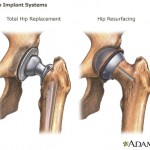
Jami Rubin of Goldman Sachs suggests that splitting Johnson & Johnson’s three divisions into separate companies would free up money to invest, help the company grow faster and provide a bigger return to shareholders.
The company is still foundering after a series of high-profile managerial missteps in recent years, including recalls and legal difficulties. The Asbury Park Press points out that the company’s most recent profits are down, its over-the-counter drug division will not be back to full speed until late next year, and it anticipates paying out hundreds of millions of dollars to settle litigation.
A major portion of those litigation costs relate to lawsuits over faulty medical devices.
Johnson & Johnson’s DePuy Orthopaedics division was obliged to recall its line of all-metal hip implants in 2010 after nearly half of the patients who received them had to get them replaced within six years.
And the company recently recalled four different types of transvaginal mesh implants, used to treat urinary incontinence and pelvic organ prolapse, after hundreds of lawsuits alleging that they caused severe pain and injuries for recipients.
Plaintiffs in lawsuits concerning both devices claim the company intentionally marketed them while suppressing information about their potential danger to patients.
According to the Asbury Park Press, Johnson & Johnson chief executive officer Alex Gorsky dismissed the idea of splitting up the company. He told analysts Tuesday that Johnson & Johnson would need to be more selective and decisive in pursuing products that will pay off.
But Rubin said splitting up the divisions into separate companies makes sense because:
- The three divisions have different customers, manufacturing, distribution, research and development, and regulatory processes, making it unclear how they make the company more efficient.
- Each has different investment requirements, management philosophies and growth prospects, leaving executives with the tough task of deciding where to invest for future growth.
- And the businesses that are doing well are not reaching their full potential. Its faster-growing pharmaceutical and medical device divisions, for example, have been absorbing the cost of improving manufacturing plants for its consumer business.
You should consult with a doctor if you have any ongoing symptoms or health concerns. If you have significant injuries, you should also consult with a lawyer familiar with the DePuy hip implant or transvaginal mesh case to discuss your legal rights.
See the story here:
https://www.app.com/apps/pbcs.dll/article?AID=2012307170031&nclick_check=1
